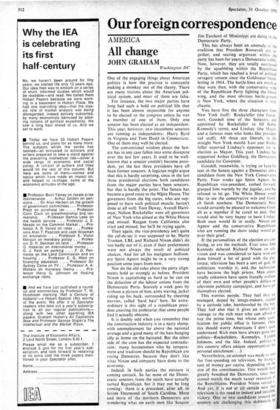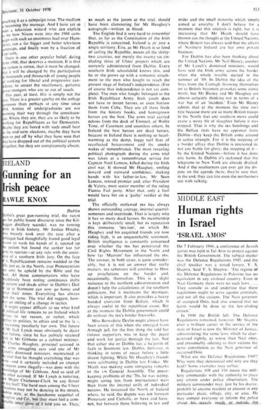Our foreign correspondence
AMERICA
All change
JOHN GRAHAM
Washington One of the engaging things about American politics is how the practice is constantly making a monkey out of the theory. There are many truisms about the American pol- itical system, and most of them are false.
For instance, the two major parties have long had such a hold on political life that it has been almost impossible for anyone to be elected to the congress unless he was a member of one of them. Only one senator has been elected as an independent. This year, hoWever, two incumbent senators are running as independents: Harry Byrd in Virginia and Tom Dodd in Connecticut. One of them may well be elected.
The conventional wisdom about the Sen- ate has in any case fallen into some disrepute over the last few years. It used to be well- known that a senator couldn't become presi- dent, yet the last three presidents have all been former senators. A logician might argue that this is hardly surprising, since in the last three presidential elections both candidates from the major parties have been senators, but that is hardly the point. The Senate has become a good route to the W,bite House. The governors from the big states, who are sup- posed to have such political muscle, haven't done at all well; Tom Dewey, Averell Harri- man, Nelson Rockefeller were all governors of New York who aimed at the White House and missed. Reagan from California also tried and missed, but he'll be trying again.
Then again, the vice-presidency isn't quite the cul-de-sac it was supposed to be. Harry Truman, LBJ, and Richard Nixon didn't do too badly out of it, even if their preferments were not always the result of political choices. And for all his malignant buffoon- ery Spiro Agnew might be in a very strong position some years from now.
Nor do the old rules about the piny align- ments hold as strongly as before. President Nixon is capitalising as hard as he can on the defection of the labour unions from the Democratic Party. Scarcely a week goes by without a picture of him, arms waving, jacket riding up his back, surrounded by cheering navvies, called 'hard hats' here. So extra- ordinary is this sight of a republican presi- dent courting the proletariat that some people find it actually obscene.
It is doubly odd when you remember that the construction industry is in a nasty slump. with unemployment far above the national average and a good many of the hats hanging idly at home on the hatstand. But the other side of the coin has the expected contradic- tion: many businessmen who by tempera- ment and tradition should be Republican are voting Democrat, because they don't like what Nixon and company have done to the ecor.omy.
Indeed, in both parties the mixture is coming unstuck. So far none of the Demo- cratic senators from the south have actually
turned Republican, but it may not be long coming: there is a precedent, after all, in
Strom Thurmond of South Carolina. More and more of the northern Democrats are wondering what on earth men like Senator savagery unseen since the Goldwater blood- letting in 1964. The battle-lines are much as they were then, with the conservative sling of the Republican Party fighting the liberal wing, and the most obvious battle-ground is New York, where the situation is truly chaotic.
You have first the three characters from New York itself: Rockefeller (the Gover- nor), Goodell (one of the Senators, and appointed by Rockefeller to fill Bobby
Kennedy's term), and Lindsay (the Mayor, and a famous man who looks like presiden- tial stuff). All three are liberals, in the straight New York mould. Last year Rocke- feller suported Lindsay's opponent for re- election as Mayor. This year. Lindsay has supported Arthur Goldberg, the Democratic candidate for Governor.
Goodell, meanwhile, is trying to keep his seat in the Senate against a Democrat and a candidate from the New York Conservative Party. Four weeks ago Spiro Agnes% , the Republican vice-president, rushed forward.
grasped him warmly by the jugular, and has
refused to let go. The White House would like to see the conservative win and Good- ell finish nowhere. The Democratic Party
would certainly be pleased to welcome Good- ell as a member if he cared to join. They would also be very happy to have Lindsay. Both men would fit in easily. Nixon and Agnew and the conservative Republicans who are running the show today would get over their grief.
If the personalities of the election are con- fusing, so are the methods. Ever since John
Kennedy debated Richard Nixon on tele- vision and was considered to have won and done himself a lot of good with the elec-
torate, television has been a sort of god. All
politicians worship it, and–the technicians have become the high priests. Men almost totally unknown have spent literally millions of their own and other people's dollars on television publicity campaigns, and have got themselves elected.
This worries people. They feel they are managed, duped by image-makers, cajoled
by a cathode tube, bamboozled by the box They feel also that it gives an unfair ad- vantage to the rich man who can afford to buy the prime time, but whose only quail'
fication for public office is fortune. (WhY this should worry Americans I don't quite understand. Rich men have always gone into politics—Rockefellers, Kennedys, Lyndon Johnson, and the like. Indeed, politics.in
this country offers unique opportunities for personal enrichment ...)
Nevertheless, an attempt was made to stop the free-spending on television, by tising 3 sum of money per capita, depending on the size of the constituencies. This would have greatly benefited the Democrats, since they cannot match the much vaster resources of the Republicans. President Nixon vetoed It And yet, it is not at all certain now that television is the road to instant and infallible victory. One or two candidates around the country are challenging this shibboleth II
Jim Eastland of Mississippi are doing in the Democratic Party.
This has always been an anomaly of the coalition that President Roosevelt put to- gether, and searing argument within the party has been for years a Democratic hobby. Now, however, they are totally outclassed
DC by the squabbling within the Republican Party, which has reached a level of political
stacking it as a campaign issue. The medium s becoming the message. And I have yet to eel a television wizard who can explain o me how Nixon went into the 1968 cam- ign with such an enormous lead over Hums rey, ran a far bigger and better television mpaign, and finally won by a fraction of per cent.
There is one other popular belief, dating rum 1968, that deserves a mention. It is that e system is rotten, that it must be changed, at it will be changed by the participation thousands and thousands of young people I working for liberal and progressive can- idates, to unseat the reactionary, geriatric ,ewer-mongers who are so out of touch. This year, at least, this is simply not the se. There is a greater apathy on the college mpuses than perhaps at any time since 968. Armies of undergraduates are not orming their way through the constituen- 'es. Where they are, they are as likely to be orking for Republicans as for Democrats. aybe they are bored with such small beer s the mid-term elections, maybe they have en so put off by what they have seen that ey have dropped out of the political system together, but they are conspicuously absent.











































 Previous page
Previous page